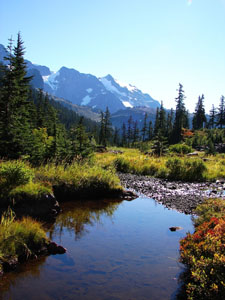Many Christians seem very happy to plant their feet firmly on the “Not Our Problem” side of the environmental care issue. This stance, however, disregards, or has not considered, much of what Scripture has to say about the role of believers in the world. I’d like to post one a day, for your consideration.
Reason Number Two:
Man is God’s appointed steward over the earth. If we are to be good and faithful servants, we cannot shirk our responsibility and pretend the state of God’s creation is not our problem. The purpose and goal of our relationship to creation is the glory of God.
As described yesterday, God has placed man in three eternal relationships: man to God, man to man, and man to creation. Man’s relationship to creation is that of a steward. The function of a steward, seen in the Bible and especially in Jesus’ parables, is one who is temporarily put in charge of a master’s possessions and is allowed to exercise authority over those possessions. We must ask, what steward disregards that which he is given charge of? Or pushes it away, saying, “I have no responsibility for this”? God did not ask if we wanted to work and tend the physical creation and we have no right to remove ourselves from the responsibility he has given. In His sovereignty, He made the creation and commanded us to “subdue,” “work,” and “tend it” (see previous post for full references). The good steward, as in Jesus’ parable in Matthew 25, invests his share of the master’s possessions and gives his master back even more than he was given, showing his wisdom, obedience, and respect. In our relationship with our heavenly Master we must also show our humble worship in how we behave as stewards.
Jesus says that the kingdom of God, that perfect coming reign of the Lord, will come at a time that no one knows and no one expects. He tells the parable of the ten virgins or bridesmaids waiting through a long night with lamps full of burning oil for the bridegroom to arrive (Matt 25:1-13) In the same way, believers must be awake and ready for Christ’s return, sober minded and acting in accordance with God’s will.
Jesus then says, the coming of the kingdom of God “will be like a man going on a journey, who called his servants and entrusted to them his property. To one he gave five talents, to another two, to another one, to each according to his ability. Then he went away. He who had received the five talents went at once and traded with them, and he made five talents more. So also he who had the two talents made two talents more. But he who had received the one talent went and dug in the ground and hid his master’s money. Now after a long time the master of those servants came and settled accounts with them. And he who had received the five talents came forward, bringing five talents more, saying, ‘Master, you delivered to me five talents; here I have made five talents more.’ His master said to him, ‘Well done, good and faithful servant. You have been faithful over a little; I will set you over much. Enter into the joy of your master.’” (Matthew 25:13-21).
God has entrusted the earth to us, to “subdue” “work” and “tend” until he returns to reign in the full power of his kingdom. As the parable of the ten virgins communicates, it may be a long and dark wait and we are unsure of the time of his return, but we must be faithful and diligent in our good work nonetheless. More faithful and more diligent, in fact, because he will come when we do not expect Him! Our goal in stewardship, as the parable indicates, is to please our master by making wise decisions in His best interest, rather than our own (though as we see, acting in accordance with the Master’s will leads to blessing and favor). In a more specifically Christian way of putting it – the purpose and goal of our role as stewards over creation is the glory of God. When our Master returns we should not present him with a polluted and torn apart world, which would show little respect for His authority, His possessions, or His glory, but one that is well-tended, healthy, productive, and beautiful. It should be as He created it, full of His glory, with the additional virtue of having fulfilled its purpose within the culture of man.
As Christians, we should be the people most fervent to serve God wholeheartedly in every facet of our lives and in doing so show His glory to the nations. Then we will hear: “Well done, good and faithful servant.”
~ Lauren Merritt, The Christian and Creation
photographs by Ian Britton of Freefoto.com




